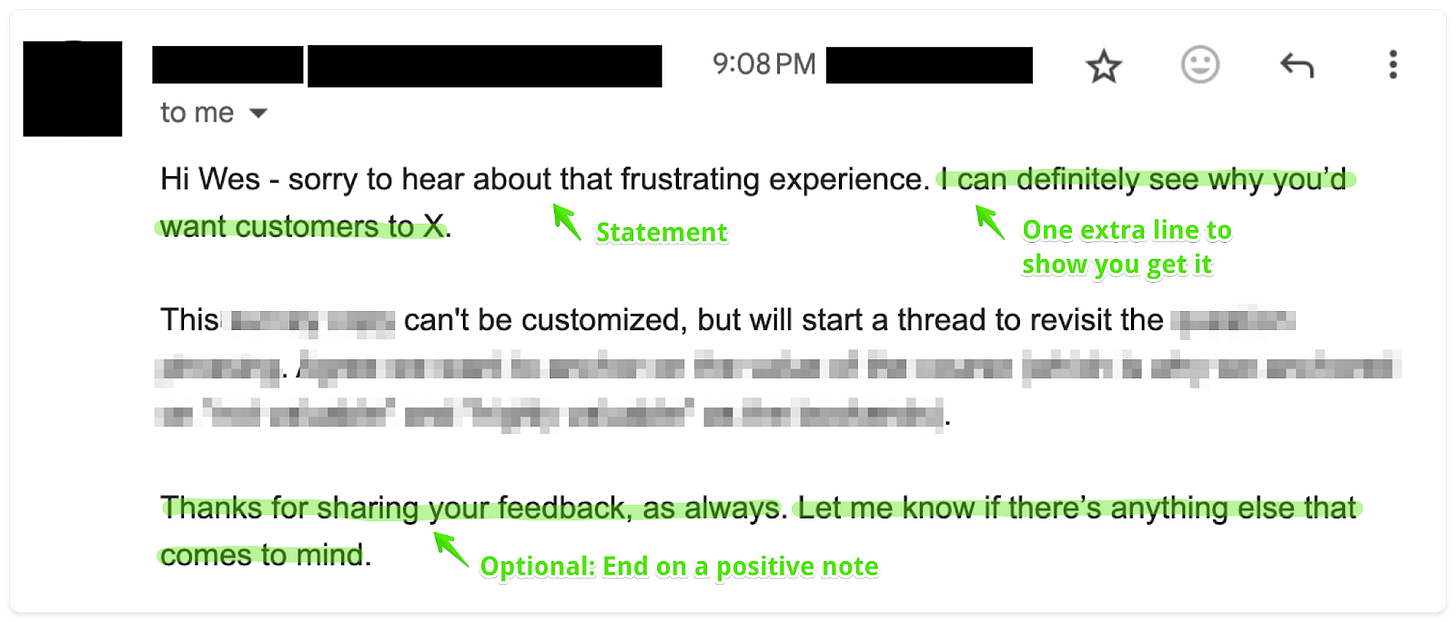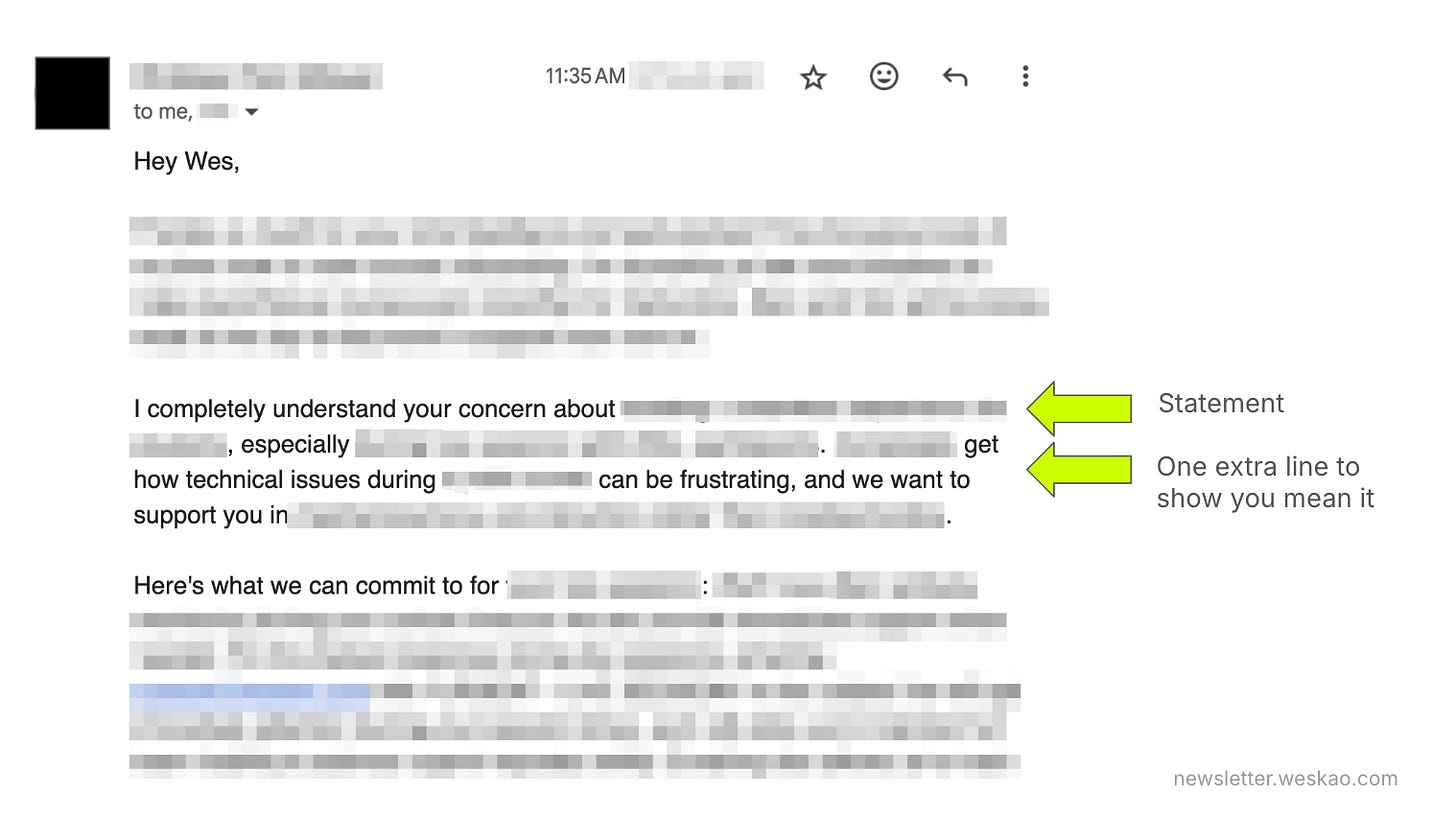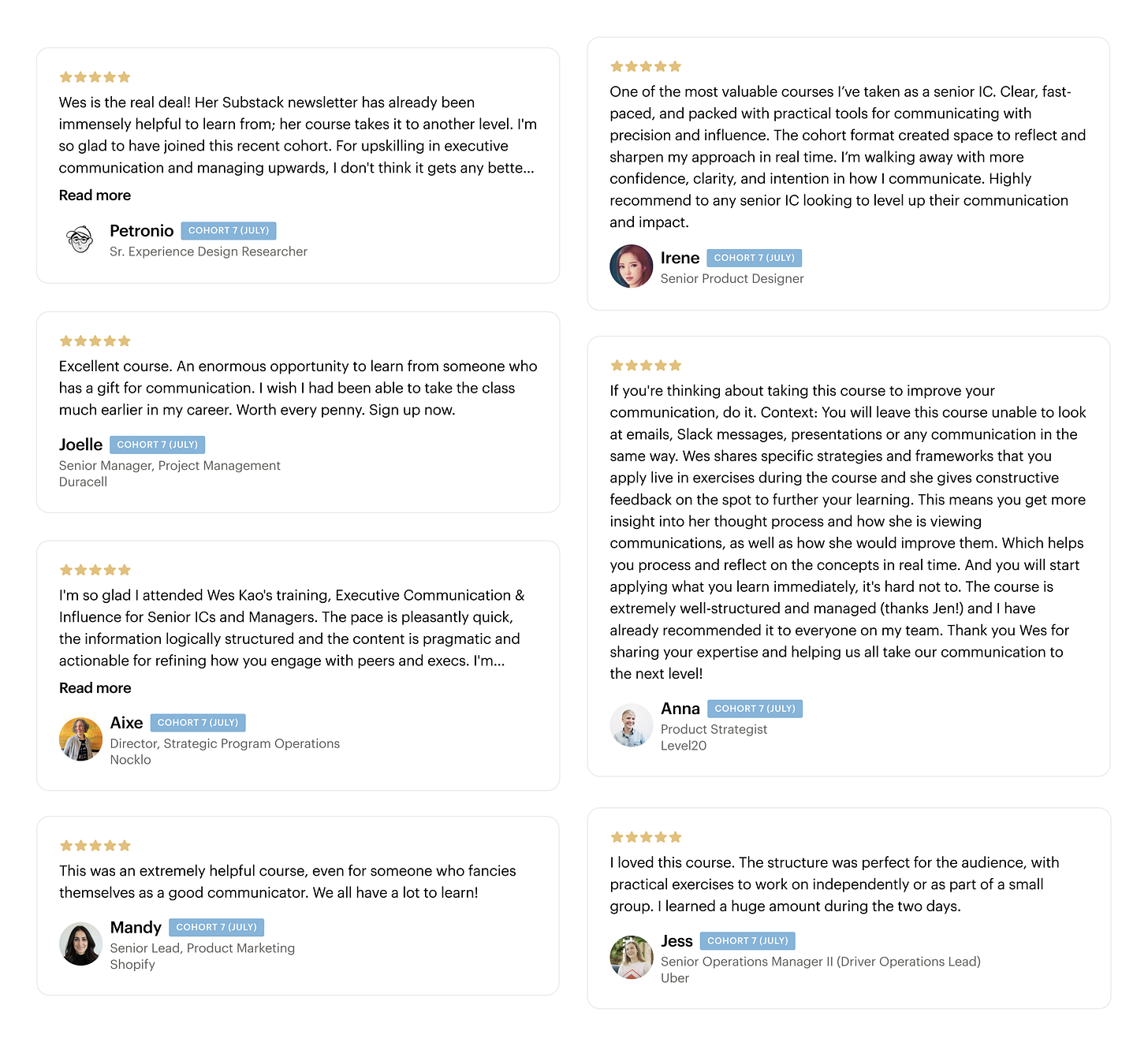To sound more sincere, do this
If you aren’t careful, you may come across as less sincere because your writing doesn’t translate your intent. Here’s how to make sure that doesn’t happen.
👋 Hey, it’s Wes. Welcome to my bi-weekly newsletter on managing up, leading teams, and standing out as a high performer. For more, check out my intensive course on Executive Communication & Influence for Senior ICs and Managers. The upcoming cohort is 80% full. → Save your spot
⛑️ If you’re looking to dramatically improve your communication and leadership, I typically work with tech leaders on: managing up to a CEO/SVP, strengthening your executive communication, and delegating to a team of ICs while raising the bar. If you’re interested in how I can support you, learn more about my coaching approach.
Read time: 5 minutes
Some people seem more sincere than others. Why? I’ve thought about this a lot.
I’ve worked with colleagues who I know are decent people, but when we interact (especially in writing), they seem quite cold.
I’ve come to realize: Your writing skill influences whether people think you are sincere (or not).
If you are unable to translate your intent into impact, your recipients may think you’re kind of a jerk or you don’t care. This can accidentally damage relationships without you even knowing it’s happening.
For example, there are times when I get a note from someone and I think, “I feel seen and heard.” I feel acknowledged EVEN IF they’re denying my request, or telling me something I don’t want to hear. I still like the person and feel understood.
Other times, I get a note and think, “This person doesn’t really seem like they care.”
As operators and leaders, we will inevitably get customers, stakeholders, etc who complain or express frustration to us.
The way we respond can either build or diminish goodwill.
With a few minor word tweaks, you can sound more sincere and increase goodwill.
Your audience will judge you based on how you make them feel
Your audience will judge you based on how you make them feel. Not on what you intended to make them feel.
In other words, intentions don’t mean shit.
If you sound unhelpful, your recipient doesn’t think, “Gee, I bet this person is actually helpful. They’re just bad at communicating.”
No. Your recipient thinks, “This person is an asshole.”
I saw a note this week that I thought would be perfect to dissect. This note is already decent, and I have a great relationship with the operator who wrote the note. They’re competent, friendly, and fair, and I love working with them.
When I got their note though, I thought, “If I didn’t know this person, I wouldn’t realize how warm they actually are in person.”
If I were only judging them by their writing, I would think they didn’t really care about the problem I was telling them about.
The “One Extra Line” rule
A simple way to sound more sincere is to use what I call the “One Extra Line” rule:
Don’t only state that you understand. Add one extra line to show that you understand their frustration.
For example, here’s the email I received this week:
Before:
Hi Wes - sorry to hear about that frustrating experience.
This [redacted] can't be customized, but will start a thread to revisit the [redacted]. [Redacted]
^ This note isn’t terrible. He says “sorry to hear about that frustrating experience.” But it’s a bit matter of fact.
When you only say “I get that you’re frustrated” then move on quickly, you can come across as dismissive.
Do you really get that I’m frustrated…or are you trying to change the topic and move on as fast as possible?
After:
I recreated the email to write my “after” version. Here’s what it looks like if we use the “One Extra Line” rule:
Hi Wes - sorry to hear about that frustrating experience. I can definitely see why you’d want customers to X.
This [redacted] can’t be customized, but will start a thread to revisit the [redacted]. [Redacted]
Thanks for sharing your feedback, as always. Let me know if there’s anything else that comes to mind.
In the first paragraph, the note sounds more sincere because we added one line to validate why the person’s frustration is legitimate.
That one extra sentence can do wonders to elevate the warmth of the note.
To be clear, you don’t need to go overboard. One or two sentences will do.
By the way, I like to end with “thanks for sharing your feedback” even if I’m not able to accommodate someone’s request. I want to show appreciation that they spoke up. Personally, I like ending on something positive like this because it’s a free way to build goodwill.
Here’s another example of a real note that uses the “One Extra Line” technique. I got this email yesterday and was excited to share it with you.
I’ve emailed many times with this person, and feel a lot of goodwill toward them. Almost 100% of the time, I think, “They get it. I feel heard. I like this person. They genuinely care about me.”
The amazing thing is, I feel this way even when this person tells me things I don’t want to hear. Their genuine posture comes across, in part because they are a skilled writer, and also in part because they regularly use techniques like the “One Extra Line” rule.
Check out their note:
Hey Wes,
I completely understand your concern about [redacted], especially [redacted]. [Redacted] get how technical issues during [redacted] can be frustrating, and we want to support you in [redacted.]
Here, the person says she understands my concern, then she adds ONE EXTRA LINE which makes all the difference.
We’ve all heard the advice of “show, not tell,” but it can be hard to know how to apply.
The “One Extra Line” rule is an application of “show, not tell.”
In this case, telling is simply saying “I get you’re frustrated.”
Showing is proving to someone that you get it, which you can do easily by adding one extra line about the issue and validating their experience.
Remember: The next time someone expresses their frustration to you, don’t be too quick to move on.
If you want to make them feel seen and heard, add one extra line to expand on what they told you and demonstrate that you really hear them.
Have you noticed certain colleagues, account managers, etc seem more sincere than others? What do you notice they do or don’t do?
If you have any examples, feel free to share and I can potentially dissect the note in a future newsletter.
Hit reply because I’d love to hear from you. Thanks for being here, and I’ll see you in two weeks on Wednesday at 8am ET.
Wes
Connect with Wes
Is this your first time here? Subscribe (it’s free)
Follow me on LinkedIn for more insights
Improve your ability to sell your ideas, manage up, gain buy-in, and increase your impact in an intensive 2-day workshop. The August cohort is 80% full. This is the second-to-last cohort of the year. → See course details
Learn more about 1:1 coaching to sharpen your executive presence, influence, and ability to delegate
✨ Course update: Executive Communication & Influence for Senior ICs and Managers
I just wrapped up the July cohort last week, and the new student reviews are in. Here’s what the most recent students from Shopify, Uber, Duracell, etc are saying:
NOTE: The upcoming August cohort is 80% full. If you’ve been considering the course, I hope to see you in class. → Get the course details and enroll here






Thanks for sharing this Wes. I will work on using this one extra line method. Coworkers that I perceive to be sincere are good listeners. They don’t seem to be in a hurry when listening. They make me feel that what I’m expressing matters. They don’t jump to conclusions, but want to understand the full context. They read between the lines, and are able to see not only what is said but what is not said.
This method reminds me of writing music. Making sure the transitions are not too jarring. There is an offness to a soft piano line immediately followed by a blaring trumpet.
Looking forward to your next post!
When I first read the title to this post I found myself avoiding reading the rest…it was interesting that the idea of ‘instantly sound more sincere’ to me came across as inauthentic…but just as you describe I trust you, I know your work is about giving people really useful tools to strengthen relationships authentically, so when I finally came back to read this (now) of course I could see all the value you provided. 🙏When I worked at McKinsey we were taught a version of this..and the simplest way then was to start with courtesy/politeness eg Hello, hope this finds you well or thanks for your email…I appreciate the second example you offered acknowledging the issue and especially ending with a thank you. So, thank you Wes for consistently sharing awesome tips!